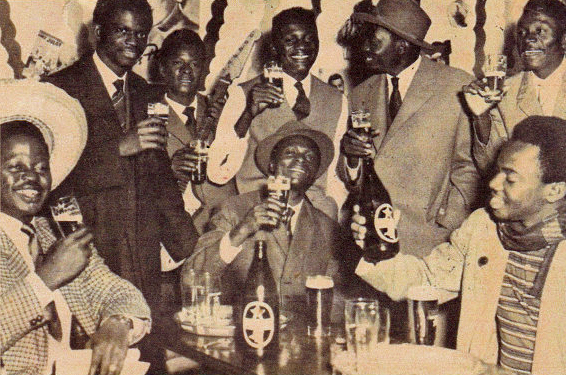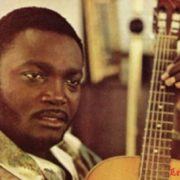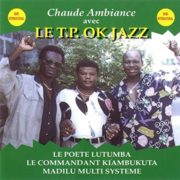
About
T.P. O.K. Jazz was one of the most prominent bands of the Democratic Republic of the Congo, then known as Zaïre. The band was officially presented on June 6, 1956, at the O.K. Bar in Kinshasa town. The band reached its apogee in the 1970s and maintained its popularity until the beginning of the 1990s. T.P. O.K. Jazz was directly linked to its leader, the charismatic Franco, who brought it to its greatest success.
Beginnings
Auditioned by Henri Bowane, Franco, along with his mentor Dewayon integrated the legendary Loningisa studio in 1953. Both excellent auto-trained guitarists at the time. They met a group of other musicians who already signed for the studio. Franco associated with some of the studio musicians and started performing at clubs.
In early-1956, their group started performing for at O.K. Bar, in Kinshasa. “O.K. Bar” name was the initials of its owner, Oscar Kashama. At some point though, the band needed to perform outside O.K. Bar, but needed a name. They snapped the O.K. name, and attached the Jazz suffix, just like African Jazz did, three years early. In an interview Brazzos (a former musician) gave to the document Faces of Africa, the group was arguing what name to choose when Oscar, who was watching for some times, entered the conversation and suggested they adopt O.K. Jazz since they performed at his bar anyway. The initial core members included Franco, Vicky, Rossignol, Essous, Pandi, and De La Lune.
The rise of The Almighty O.K. Jazz
In the next decade, some members left the band and Franco took control of it. He started recruiting new members and hence growing the band. They started touring abroad and Franco also beefed up O.K. Jazz music quality through technology and talented member recruitments. The bands suffered some defections and went through ups and downs, but overall, it became one of the top bands in Congo. O.K. Jazz also went by with its new name “Tout Puissant (Almighty) O.K. Jazz” or T.P. O.K. Jazz.
The Apogee
The following decades went through in an almost similar pattern. Some members left the band while others joined to close ranks. T.P. O.K. Jazz continued its rise. At the end of the 1970s, it undoubtedly became the top band in Congo and a very reputable one on the continent and beyond. The band toured several destinations worldwide and Franco grew his success as well. The story of T.P. O.K Jazz continued to evolve paired with that of its charismatic leader. In order to celebrate Franco’s achievements, president Mobutu raised him to the title of “Grand Maitre de la Musique Congolaise”. The “Grand Master of Zairian Music” was the greatest accolade the country could honor a musician with.
Then at the beginning of the 1980s, in a very clever move, Franco recruited Madilu System, whose career became a little stagnant at the time. Madilu’s charming voice on top of Franco’s compositions brought to T.P. O.K. Jazz some of its most glorious years. Songs like Mamou, Non, Makambo Ezali Minene, became anthems and colonized the DRC’s musical bandwidths.
Franco and O.K. Jazz’s Decline
O.K. Jazz’s story was strongly linked to that of its leader, Franco. Unfortunately, the latter fell hill towards the end of the 1980s. Defections became more frequents. The number of performances drastically dropped. Rumors and Gossip spurred about Franco and he appeared very thin on TV. The situation clearly affected him too. Franco reportedly suffered from depression. Kinshasa apparently was very superstitious at the time so some of the public at the time associated his condition to a backfiring black magic practice. T.P. O.K. Jazz meanwhile, although still holding on, suffered from its leader’s issues. On October 12, 1989, Franco lost his ultimate battle against the illness that was “eating him inside”.
Following Franco’s death, the remaining artists, led by Lutumba Simaro, stroke a deal with Grand Maitre’s family continue performing with the band. Following a dispute with the family though, they had to abandon the T.P. O.K. Jazz label and went on to form the Bana O.K. band (O.K.’s Children).
Legacy
In my humble opinion, T.P. O.K. Jazz left three big contributions to the Congolese music landscape. The first and obvious one is that it helped promote it beyond DRC’s boundaries in an unprecedented way. It helped Congolese culture and music style like soukous and rumba become known. The reverse side of this success is how Mobutu took advantage of that soft power to his dictatorship’s interest. That is a subject for another post though.
Secondly, through T.P. O.K. Jazz and Franco helped revolutionize Congolese music. Early enough, Franco understood the importance of quality in music, and heavily invested in instruments and talented musicians. The investment, in turn, led to high quality and creative songs, styles, and performances.
Lastly, Just like the Chem-Chem Yetu, Viva La Musica or African Jazz, O.K. Jazz was a nursery for Congolese musicians. Many of its members became very successful ones and in turn deeply impacted Congolese music. Lutumba Simaro, Mayaula Mayoni, Madilu System and Mpongo Love are just some of them.




Leave a Reply